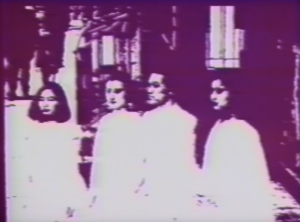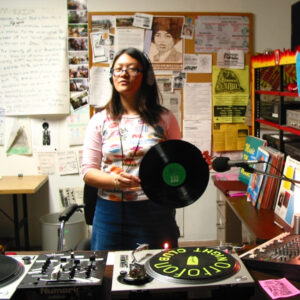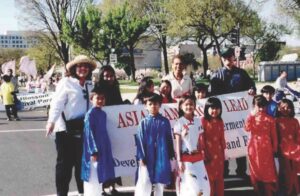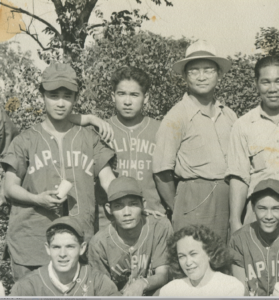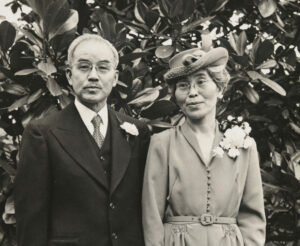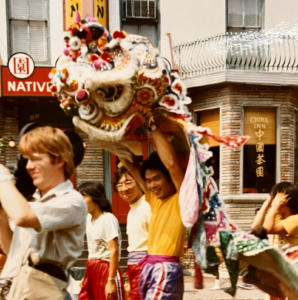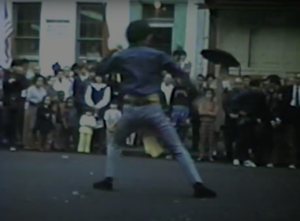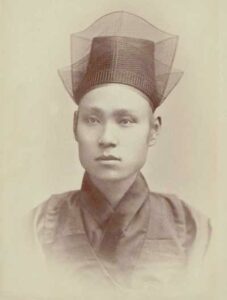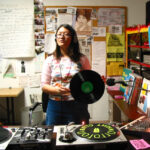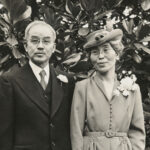
George:
My name is George Che. I’m a senior at Benjamin Banneker Academic High School, and I’ve been in a lead, this would be my fourth year in AA lead. So I’ve been with a lead since my freshman year. And for me at least, I wanted to talk a little bit about, one of the questions on the email that you sent was how would I learn about AA lead and what inspired me to be a part of it? So if I may, I’ll take you through what my experience has been. So I first heard of a lead through my school’s community service program. So Benjamin Banneker basically does this thing where all students are basically assigned to a site their freshman year. And as the years go by, they can either choose to stick with their site or move from it.
And I remember freshman year of high school I was assigned to AA lead as my site. And at that time we were virtual and I had the DC programs manager at that time, his name was Na Na. And so I remember during that time I received a Google form and this Google form basically allowed me to choose what I wanted to participate in. So there was Yelp. And then as I was reading through the form, I saw another option and that there was this program called Youth Council. And as I was reading the description, it talked about how it gave youth more of a voice and just an opportunity to choose issues in their community that they could tackle of their own accord. And I was reading it and to me this sounded like one of the most perfect opportunities to get my hands into something that was a little bigger than myself.
And really at this time I was 14. I was just entering high school. And to be honest, I was never the type of person who would kind of willingly try to put myself in spaces where I would take up more responsibilities or be a part of something bigger. But there was something about this opportunity and just reading, it was something that I hadn’t heard of before Youth Council, how it prioritizes the voices of the youth. And it pretty much places all responsibility, not all responsibility, but it places most of the deciding power in what we do in ourselves. It’s something that we basically move forward with our own efforts. And at that time, I was someone who liked to stay cozy and leadership to me at that time never sounded like it was in the cards for me. At least that’s what I thought. Here I am four years later and I’m the youth council ambassador, but what I think most stuck out with me and what made me stick with this because I think it was sophomore or junior year, we had the opportunity of switching our sites, but I was like, no, I’m going to stick with this one.
I want to ride this one out. I want to ride this out. And I think the reason that I stuck with it was Youth Council for me, which is the main program that I participated in youth council to me was fostering an environment for growth in a way that I hadn’t seen before, leaving in the hands of the students to some people, I think that my son a little crazy, but it wasn’t just like that. I mean the community that I was able to build and the relationships that I was able to form as a part of my time with a lead, they are all invaluable to me. I cherish them every day. The supervisors I’ve met through the year, Diana, Joseph Landy, these are all people that they’ve come into a lead, some of them have left, but I think all of them have left a very big impact on me one way or the other.
And I cherish this opportunity for having been offered it and for how far it’s taken me in my own personal growth on top of the amazing projects that we’ve been able to do, whether that be on gentrification in Chinatown, working on food insecurity projects, on environmental racism, these are all things that in all the core cohorts that I’ve been a part of over my four years, these are things that we have decided upon wholeheartedly, right? Because people, when they come into youth council, there are a lot of things that they’re passionate about. And one of the biggest things about youth council is that you learn how to compromise. Compromise is, I guess one of the biggest skills really you can learn through here is that everybody has so many things that they want to accomplish. But what I think is beautiful about Youth Council is that even though you may choose a topic that you personally didn’t have as much of an attachment to, there are a plethora of different ways you can approach a topic.
For example, just this year we focused on food insecurity and there were opportunities for the people in our groups to do social media, outreach, research, awareness, as well as grassroots organization fundraisers, donating food to food banks from stuff we got from bake sales. And I think to me, the ability that is given to each and every youth and the environment that AA lead creates with the youth council program, I think for me that’s what stuck out to me about a lead and that’s what inspired me to be a part of it and stick through it all these four years.


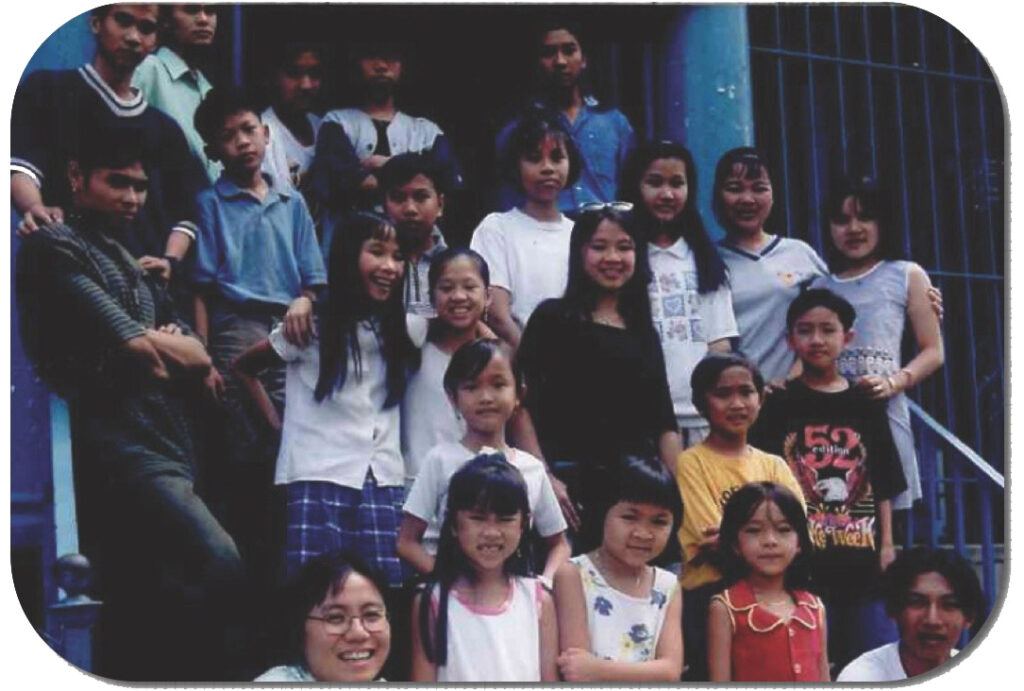

AALEAD youth greet one anotherCourtesy of AALEAD
Youth gather for Terrapinoy Day, an annual exploration of identity, culture, and leadership for middle and high school students hosted by the University of Maryland’s Filipino Cultural Association (FCA).Courtesy of AALEAD
Youth gather at the AALEAD Center for a visit from D.C. Mayor Anthony Williams, 2001.Courtesy of Sandy Dang
Courtesy of AALEAD
Sandy:
Yeah, that’s really great to hear George. And I think listening to you reminded me when I first started founding this organization at the time, it was different than what is now in the sense that there were 6,000 Vietnamese refugees living in the DC Mount Pleasant and Columbia Height Shaw neighborhood. And at that time, many of the Vietnamese refugees who came, they didn’t speak English at all, and they feel at loss because they didn’t learn English, they didn’t know about the school system. And so all of that really had an impact on the youth. And I started the nonprofit because I want refugees, young people to have a voice. So listen to George and what you were talking about, it’s really reminded me why I founded this organization in the first place is to have young people, Asian American to have a voice, young people to have a voice.
And we called it you power at the time, right now you call it youth council. And at the time, young people were making decision of how to share their struggle in the school system, in the neighborhood, and what kind of action they want to take up to have their voice counted. You have their opinion and their stories counted. So they started their youth power group, and we have high school students in the community mentoring junior high school, middle school and elementary school children. They started a program where they design different after after-school activities for the younger children and on weekend as well. So they started a picnic program, a field trip program, and they were taking younger children in the community to visit museums. You have outings, you would have picnics, and that was a way to build community is that high school student designing activities to help the younger refugee children in the community. So we have those. And they also went and testified in front of the DC Council to advocate for funding to support afterschool program, the Summer U employment, as well as advocating for having a bilingual Vietnamese counselors at the Lincoln Middle School as well as some of the high school. We have quite a few student at Vinegars and also Bemo High School and Wilson at the time is called Wilson. So anyway, so we’re listening to you just reminded me of why I found this organization in the first place.
George:
Yeah, I think one of the most beautiful things about AA lead and one of the things that I really was able to grasp through my time here is that after hearing you talking about the early days of AA lead and my experience with it now, I definitely feel like that ambition and that desire for people to have their voices heard and for people to be able to come together and become something more and so that they can push out the passion that they feel for themselves and for their peers and push that out towards the community, I think that’s one of the things that AA lead has worked so very hard to sustain over all of these years that it’s been running. And I think another big thing too is I guess the expansion of it all as well, because one of the biggest things that I value when it comes to communities and spaces where you have different people is the fact that DC is an incredibly diverse city.
I was born here, I was born in Ward seven, and I’ve lived here my entire life all 17 years. And so at every step that I’ve taken throughout life, throughout high school, middle school, I’ve been surrounded by peers who are so much different than me, some who are so similar to me. And I think for me, the most important thing of it all is being able to be part of creating a space where we’re able to be more understanding of each other. And I think that’s another thing that a LE strives to do even now. Because though the way it’s being done, I think it morphs over time. It changes. A e has opened its doors to people of all backgrounds now it’s, it’s not just Asian American Vietnamese refugees, but I think that is a pretty noble step into the future because you’re calling people in to your experience.
And I think that’s most important when it comes to sharing it, is being able to create spaces with people who you are able to trust them and you’re able to experience each other’s culture and hear your stories and share them together. Because when it comes to communities of color and how they interact with each other, I think that’s where those spaces shine because people always say that the world is a melting pot. The US is a melting pot. But me personally, I don’t see it that way. I think everyone, every individual in every community has their own reason and their own things to contribute to spaces. And I think that’s the reason why we work so hard to create these spaces. That’s the reason why I work so hard to create these spaces and why I work so hard to leave the youth council better than it was previously.
I remember when I was still in youth council, this was last year, I was very, I was an anxious person and the thought of taking up a leadership position like the youth council ambassador role was something that really scared me. I’ll be honest, I was trembling when I was giving my speech because I was unsure of how I would be able to step into those shoes. But I thought back and even after hearing you speak about the lengths that the youth back then did to fight for their community and to really bring about some change, it reminded me of seeing the two generations of previous youth council ambassadors that I was able to work under and that was able to work with in these projects. And I think that that drive and that ambition to see it out to the end is something that is intoxicating.
And I think a e and youth council, it’s full of it. And so I think for me, that’s one of the biggest things that gave me that push, that final go ahead. Because I looked at them and I looked at myself and I was like, you, I’m not so far off from that role. I’m not someone who is unbecoming of being the youth council ambassador because I had what it takes. And I think a lot of people do, and I think that’s what it’s always been about is about one of the main things youth council works on is leadership opportunities. And I think that’s one of the things they provide so well because I think the space that it fosters is something that doesn’t give just one person the ability to take charge of something because you’re all in it together. And I think AA lead is something that without it, me personally, I think I would missing a lot of personal growth over my high school career because me from freshman year and me now worlds apart in so many ways. And I think for a large part of it, I had a lead to thing for that.



Courtesy of AALEAD
Courtesy of AALEAD
AALEAD selling Vietnamese food at the Mount Pleasant Festival, 2000.Courtesy of Sandy Dang
Sandy:
No, I think that what you said is really makes sense to me because early in the early day we would like, what we did was we want our young people to realize their leadership capability. And I think the fact that you said then from freshman year until now, you had grown so much. And I think that’s the purpose that I started a e is to encourage young people to find opportunity to lead and they don’t have to be in a position they can lead from anywhere. And what you just said about how aa E is open to connecting people of color and connecting students each other, telling their stories, I think that is basically what we did from the start. It’s just that encouraging people to come in. And the reason is that instead of court Vietnamese American leave, I work with the board to say we would like to think about the future.
We would like to think about the future where we are broaden up, we broaden the scope of our work and we call Asian American leave, but we welcome other students who wanted to come and join this organization and giving opportunity for young people to connect. I think that, like you said, we have more in common than we realize and we have more common in terms of stories. And then what you said about staff, I mean, you had connected with a lot of the incredible staff and I think that AI had been like that from the very beginning. We have incredible staff who their heart is all about the young people. And I have been very fortunate when I started to have people like Maria, she is an immigrant from El Salvador. We have people like Invi who’s come from Norway, we have Patty who is from, she was born in Taiwan, but she was with Ailey.
And then we have incredible staff, then we have people like Han who’s from Vietnam. And so we have incredible diversity of staff and people who really care about the young people. So when you said that you connect with all the staff that you really incredible staff, I think that reminded me from the very beginning and we had incredible board of directors and I think my whole motivation was to create an organization belong to the community and it going to address the need of the community. So it will grow and change over time. But I’m happy to hear that, George, that you feel the impact of the organization, the U Council, and how you take up leadership and how you have sharpened your leadership code capability. I think that’s something I’m really happy to hear. And I think that from the very beginning and a lot of people, a lot of hard work. We started with $15,000 to start organization and we work with so many people who are volunteer, who are giving their time, their balance, so mentors and tutors and then parents. And I’m very happy to hear that you feel that the organization is really meeting the need of young people in the community. That’s very happy. I’m very happy to hear that.
George:
And I think when we’re talking about the staff, the students, the volunteers, the parents, even everyone who is a part of a lead one way or another, I think one of the major things that has kept everything going is at the center of it all, even right from the get-go at the beginning, I think there’s always been this core belief or this unwavering faith in the community, the staff, there’s always been an unwavering faith, a belief in each other that we can lift each other up. And I think that even until now, that’s something that we have never lost sight of because from my personal experience in the youth council, Landy and Joseph, the youth council supervisor and the DC programs manager, they both have, I think displayed an admirable and a wholehearted belief in the students and the youth and those that come to programs every week, those that show up every time, you can really tell that there’s a love for what everyone does here because when it comes to fostering a next and creating a new group or a new set of people who are here to pick up after the old generation, I think there’s a transferring of the love for the community that has been built by those who come before and by a hope and an ambition for what we know that we are capable of.
Because as long as people pour their love into the next generation, pour the hard work and dedication that had been shown to them previously and they pay it forward, I think when we do that, we are truly showing, or may I say the previous iteration is showing us that they too believe in our potential and our ability to keep things going.
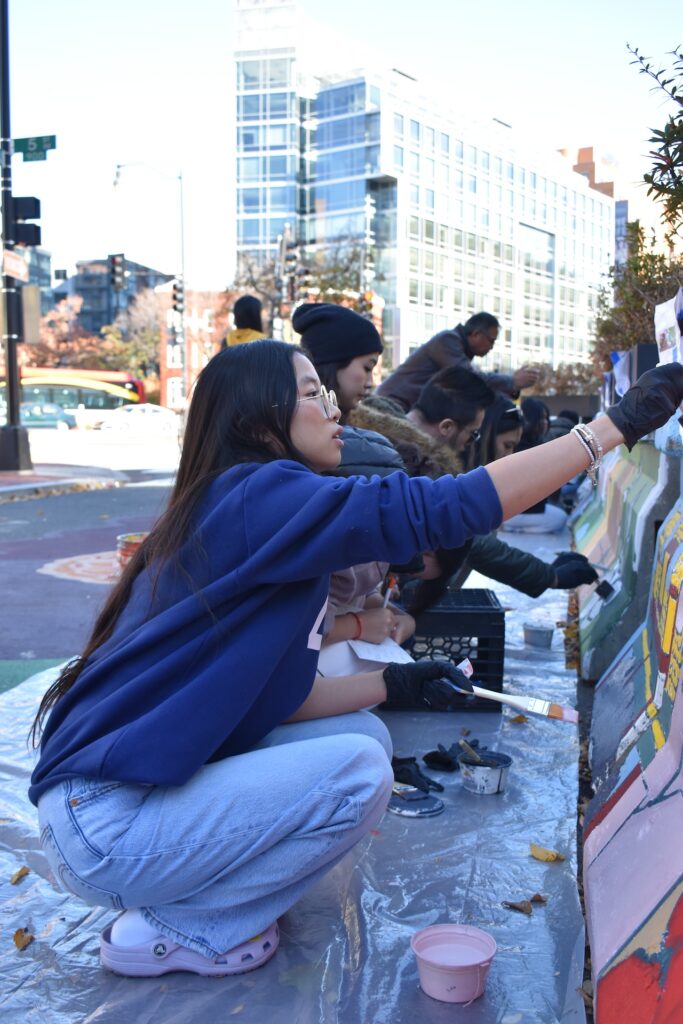

AALEAD youth contribute to a community mural in Washington, D.C.’s Chinatown.Courtesy of AALEAD
AALEAD participating in the National Cherry Blossom Festival Parade, 2003.Courtesy of Sandy Dang
Sandy:
So George, I would love for you to give us specific stories or specific moment where you feel like, where you feel I belong here. So if you can give us moment, specific moment, I think that will help people understand what you’re saying, right? So you give us a very specific moment.
George:
Let’s see. I think one really specific moment that I had for me was when I was elected for the youth council ambassador position. We had a youth council ambassador send off and transition meeting, which was where at that time Diana was still a supervisor for youth council. And so we had a meeting, it was me, my co ambassador, Don Yu, and then the previous two ambassadors, Lisa Amara. It was the transition meeting where we were going, transferring all the responsibilities and everything. It was a logistical meeting about figuring out what we had to do and how things are going to play out. And I would be lying if I said that during that meeting. And towards the end of it, I would be lying if I was saying that I wasn’t feeling overwhelmed because I was, they’re big shoes to fill. And I think Diana was able to notice that I had known her for about a year at that time, and I think she noticed the fact that I was struggling a little bit with handling all the expectations and things like that. And after the meeting, she asked me and she took me aside and sat me down.
She sat down and she spoke with me. She was like, how are you feeling? How are you dealing with all this are, what are your next plans? And she sat there with me for a lot longer than I thought she needed to, and she helped me write a list of a to-do list for what I needed to do. And she kind of sat me down and told me, you were not in this alone. The youth council ambassador is a leadership role, but the supervisors, your co ambassador, even all your peers, they’re here to support you. We are here to support each other. And that was for me, it wasn’t the first moment that kind of warmth was extended to me, but I think it was for me, the most riveting moment of such an overwhelming feeling of faith and compassion that I was shown.
Sandy:
So she actually read your mind, she feel the fact that what you were feeling at the time, and she’s very sensitive to that, and she was able to set with you and all of that and make you feel like she had faith in you. Is that correct?
George:
Yeah. Yeah. And I was even talking with this in one of my previous meetings with Joseph, but I told him that he was asking me, what is a piece of advice or what is something you would want to tell the ambassadors that would be elected for next year? And I went back in my mind and I found myself at the same moment that I just shared. It was the same moment. And I told him basically what I just said. It was that it can feel overwhelming sometimes, and sometimes you may feel at a loss. It’s definitely not an easy task to uphold and to carry, but the community of people that you would’ve built around yourself and the community of people who are there to welcome you in open arms, they’re always there for you. And that’s what I was talking about when I was saying the previous generations pour their faith and dedication into the next, and then that gets paid forward.
Because my hope as youth council ambassador and when I transition out from the role is that I want to leave the next youth council ambassadors with, I want to leave them with something because we’re going to have to write a letter to them and I want to leave them with words from me that come from a place of, I want it to come from the same place that Diana’s words came from when she was speaking it out with me. I want it to come from a place where I am wholeheartedly with the belief that they can accomplish it too and that they can go even farther than I did. Because it’s always about the stepping stones going up one after the other, and eventually you’ll have made it far. You as a collective will have made it farther than you could have ever imagined doing it on your own.
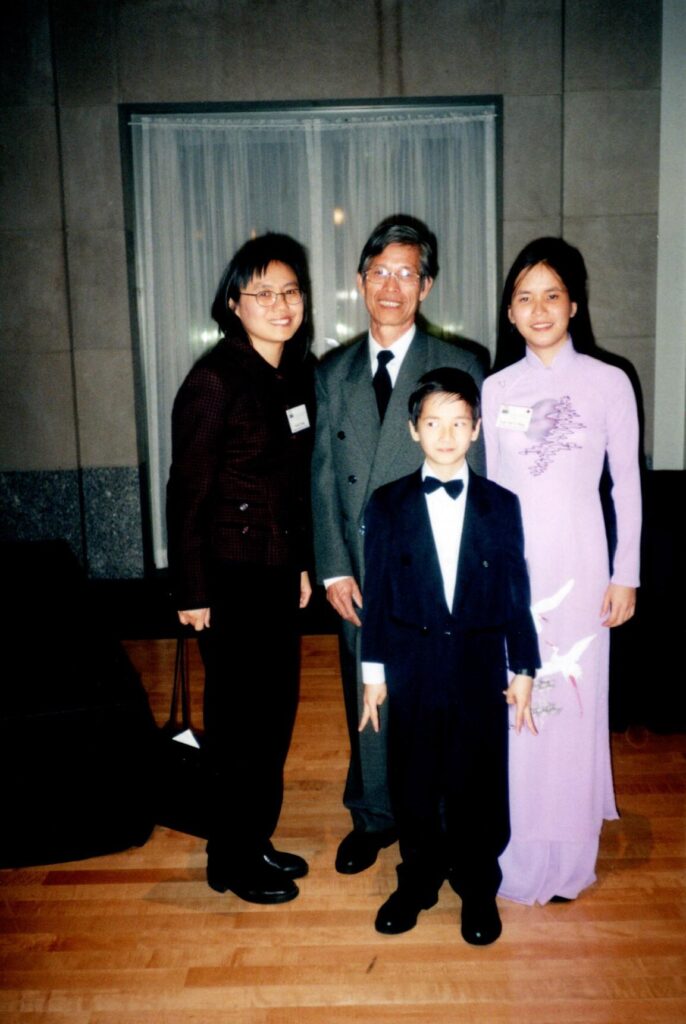


Attendees at the AALEAD Scholarship Ceremony, 1999.Courtesy of Sandy Dang
Courtesy of AALEAD
AALEAD youth at the National Museum of African American History and Culture.Courtesy of AALEAD
Sandy:
Yeah, so very good. So George, I’m here. I’m the founder of a e. So do you have any questions that you’re curious about and I want opportunity to ask you?
George:
Yeah, I guess one of my questions was, I know that a lead focuses specifically on three things. It’s on the website too. There’s education empowerment, there’s identity development, and there are leadership opportunities. So my question is what influenced, I guess, or what was something that influenced the choosing of those specific three fields, I guess, of youth growth to be the main things that a lead focuses on?
Sandy:
Very good question. Very good question. I think from the very beginning, we know that education is the empowerment tool. So we really believe that for Asian-Americans and other people of color to get an education is a way for them to move up in the world, to be able to have opportunity to learn and opportunity to open their mind. We believe that education can help you to be a better leader or to take up leadership. So that’s one. And the identity development is that as you can see that in 1995, there was so many Vietnamese refugees and they came to this country and they didn’t feel a sense of belonging, and they were bullied in school and some of them had to join gang because they need to protect themselves. And so we really believe that in order for them, they need to feel good about who they are and how they can use the language that they bought with them, the culture that I bought with them.
And they be able to decide how to adapt to this new world, to this new country that they’re going to call home. And so we want them, and I definitely believe that your experience is important, your culture is important, your history is important, your cultural heritage is important. And so really emphasize, I remember coming to the center and Vietnamese student would be singing Vietnamese songs. They would be speaking to each other in Vietnamese. So we create a space where they feel like they can be who they are. It doesn’t mean they only speak Vietnamese, they’re going to learn. They were doing a poetry class and they were written poetry in English, they were written poetry in Vietnamese. And I just feel a sense of, wow, this is so wonderful that they can have a full range. They don’t have to shut down one part of their life.
And I think very deeply that they were there because they feel whole. They feel that they can bring them their culture, they can bring their Vietnamese language. We value that. And so I think the identity development is something that even though we didn’t call identity development back then, we want to create a sense of belonging. We want to create a sense of integration. We want them to feel good about who they are and be able to value their parents, their grandparent, the history that they brought with them and be able to say, wow, my story is important and my voice is important, and being who I am and owing who I am is important. And I think that the staff feel that way. And I think many of the staff back then came to a e because they want to build that sense of belonging because they didn’t have, because I have so many volunteers and board members and staff members who came to me and said, I love a E because I wish I had a E when I was growing up.
I wish I had a E when I was living in a little town in Arkansas, and I was the only one who were Asian students in Arkansas. So I heard so many people over the year who speak to me and say, I wish I have a e or Sue Chang, who is now the executive director of a LE, she also grew up in southwest DC and she said as an immigrant, she wished she had a E. So I think that’s the kind of thing that we bill and you talk about leadership, we really believe that everyone can take up leadership and we believe in our community to mobilize our community to help each other and build community that way. And I think one thing I’m really proud AI is that we be able to attract people from so many different diverse background education from different professional, different history, and we all came together.
And I think that’s what’s very exciting. And we all modeled leadership for each other. I have to say that in the early day, I’m so grateful to people like Bob Myers and Marjorie Myers and Bui and Eric Kon, and many of the people who are on the board that feel Nash, who’s a mentor of me, and they’re willing to mentor people like me so that I can be an organization and I pass it on to others. So leadership is something that is model throughout the organization, and I think that’s one is so exciting to have that and AI continue to foster that.
George:
Yeah, I think that when you put it into perspective, you have, thinking back to all these people who came into Alead, and there are people who have been a lead ever since they were little, very, very young. And then you think to people who have joined a lead when they’re much older. You’re in high school, middle school, and you, at least for me, I’ve always had thoughts and I’ve always liked to think about the stories of people who pour their time into this organization. And I can’t imagine what it must feel like when you have people coming up to you, like you said, and they were like, I wish I had a lead when I was younger. I wish I had it. I wish there was something like that. For me, I think when you have people come to you and they’re so happy and excited that their children or their siblings or the people in their lives, the people in their life are being given the tools and just the space they need to thrive basically.
I think that to me is also another thing that keeps me going, right? There have been many times where things get busy, things they get hard. And I always like to think back to a time, it was last year when at the end of your celebration, there’s someone in my youth council cohort, her name is Lauren, and she decided to share a poem. She is from Peru, and she decided to share a poem and she shared it in front of all of the guests at our end of year celebration. And I had never told her beforehand, but my father is also from Peru. And from the moment I heard, I always felt a bit of a connection just because someone I knew also has a connection to my father’s country. I felt a little bonded there, even though I had never told her. And she spoke with so much heart about her home country, and there were tears welling up in her eyes as she read the poem and she wasn’t able to finish it.
But when she came back, I went and I spoke with her and I was like, I thought your poem was really beautiful. I thought that it takes so much courage to go up there and share your own story. And my father is also from Peru, and I think that it’s so beautiful that people, that we have created a space where people feel so comfortable being so vulnerable about who they are, about where they come from, about who they aspire to be. And through that I am reinvigorated that I am a part of this too. I’ve played a part in building that same space where I’ve seen people pour their hearts out to tens of people because they know they have a story and they know that they’re allowed to share it, and they’re not scared to do that.
Sandy:
Yeah, yeah. That is beautiful, and thank you so much for sharing that moment, because I think that that is so, you are so wise about the fact that we create a space that you feel safe enough to share your stories, your creative work, because yeah, when you’re talking about that, I just reminded that we were a new retreat with 15 young people and they started to talk about their feeling, talk about the challenge that they were facing, and at the end of that, you retreat in doing that, you retreat, a few people were writing their poem and they were sharing it. And in the creative space, actually, I was very touched when you said that because it reminded me of that time, that time when I was in Ocean City, I was driving all the young people to a beach house that one of the board member had landed to us so that we can have a U retreat to talk about U Power and their story.
So I think when you said that, it really reminded me about the importance of creating a safe space for young people to have that right, to discover their own identity, their belonging, their leadership, and their sense of purpose. And I think that’s really, really important. I felt like the spirit of a LE, even though I had been away in a sense that I always want to be, I said before an organization that belongs to the community and I let it have someone else lead that organization. But I’m very proud that you said that because the spirit of Ailey continued to move among the staff, the board, the volunteer, the young people, the parents, the community. I think that’s very beautiful. And I can say that some of the alumni who was in the program and now they want their children to be part of it as well, to take up some leadership position.
And one of them, his name is Kelvin, and he was in the a LE from very beginning, and he and his brother die, and now they have children of their own and they are coming back. They are coming to the AI annual dinners, they are donating back to the organization. So for me to see the 30 years that Ailey had been around and how they are continue to come back, like you said, paying it forward. And I think that’s so exciting and I hope that we’ll have another, we’re not talking bringing some of the alumni back and talk about what that experience, because I think it’s almost like a longitudinal study, even though we didn’t have the kind of funding that do that. But I think it’ll be so exciting to have a conversation with people like Kelvin, people who are now nurses and teachers and what Ailey had meant to them.
Right? Yeah. I have so many stories. When I was the executive director, I have a little girl, she’s eight years old, and she’s from Vietnam and her name is Hi. And she tell her mom, mom, you know what? Sandy’s a big boss. She’s really a big boss. And I was like, her mom came to me and told me the story and she said she was so proud to see a woman to being a big boss. Well, that eight years old girl, she came from Vietnam and she haven’t seen many big bosses who look like me. And I thought that was really wonderful to be an example for little girls for me playing that role as a, and now she had children of home. So I think it’s very exciting to see this full circle and how organizing and building an organization that belong to community really foster that identity, leadership, education, building a stronger community and having you involved and bringing you to be part of this a LE. I think that’s very exciting.
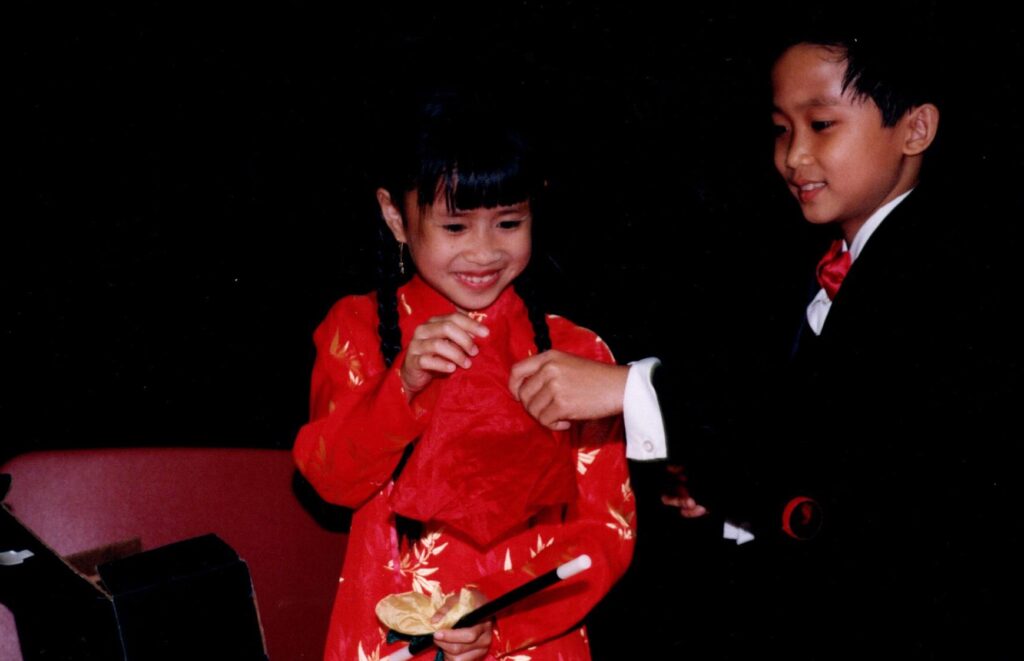
George:
I just wanted to say I’m very grateful for being able to, being given this opportunity, this opportunity was only extended to me because Dr. Be Fatima, she came to our youth council, actually she came to our youth council program one week and she sat down with the committees and she spoke with us, and she told me that she was very impressed by the way that I spoke about our project and stuff. And I think I was talking to my parents about it last night too, and I was like, this all came about because I simply spoke about, I guess the magic that was going on within AA lead and youth council. And I am incredibly indebted to everyone, everyone at Youth council, everyone. I’m so happy to have met everyone here and be given experiences like this to be able to speak about my experience because I’m happy to have been a part of this. Really, I’m happy to have been a part of AA lead and youth. And now that the time I’m spending with youth council for now, I guess maybe is ending soon, almost graduating. I can’t say that it couldn’t have ended on a better note, I think this is the best note it could have ended off on. So thank you so much.
Sandy:
Well, Joe, I have to say that I’m so impressed with you and so impressed that you had done so much for the U Council, and I want to say thank you to you. And also I just want to say that I’m very proud of a LE and you and all the work that the staff is doing because as a founder and former executive director, I’m really happy to see the organization grow without me and to go on and to continue that spirit, that spirit that you were talking about, giving a voice to young people, taking young people seriously, honoring the stories that you bought, the talent that you bought, the leadership that you bought to a, and you’ve been working on it. And so I just have to say that this has been a wonderful opportunity for me too, to be able to listen to you and really feel so proud that the organization, I started many, many years ago’s continued with that values and the spirits.
And I’m really happy to say that I’m continuing to support a e and continue to come to the fundraisers and continue to support the vision and the young people like you. It’s just make my day worthwhile, make my effort to start a LE. And also all the people, all the people that came together to start a LE. So I am so proud to be part of it, and I want to say thank you to all the people who had started AI with me and then to all the people who are currently in the program like you, George, and to all the staff and board member and donors and all of that to continue to support Ailey. So that’s my closing statement. I’m really proud of you, George, and I’m really proud to be part of this interview.
George:
Thank you so much.
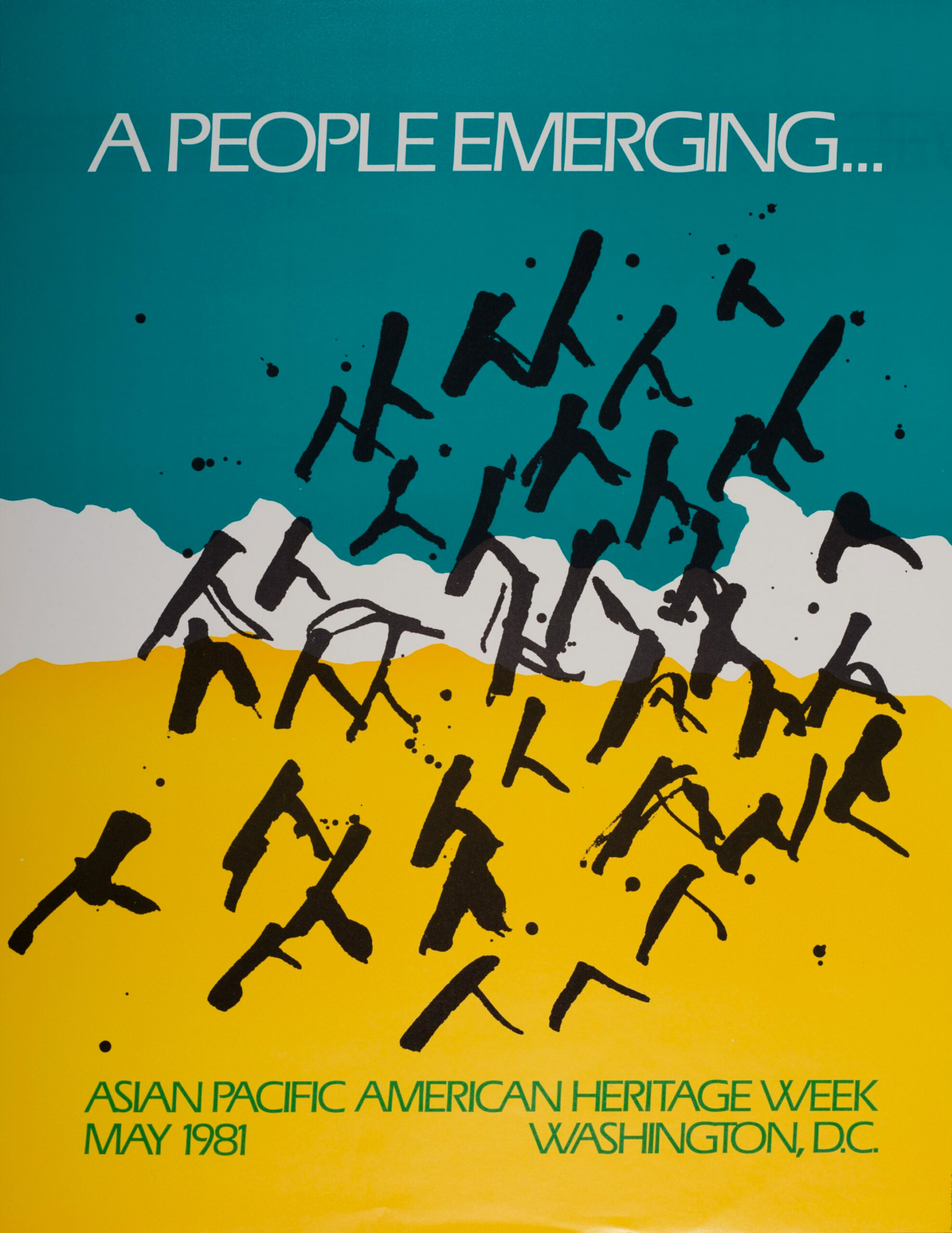
“A People Emerging” poster by Miu Eng, 1981
AALEAD’s story is part of a larger lineage of grassroots Asian American organizations that have made significant cultural impact by forming cross-cultural coalitions. Sightlines features ephemera such as this poster by Miu Eng for Washington, D.C.’s annual Asian Pacific American Heritage Week.
